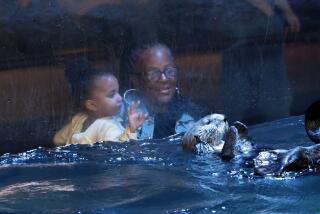Motherhood, It’s a Zoo
- Share via
It took the great ape version of the La Leche League to encourage Kalim the orangutan to breast-feed. That was just one fraction of the motherhood training given to the Bornean ape at the Los Angeles Zoo. Snacks were served as positive reinforcement for holding a toy baby right side up.
Kalim, raised at the zoo without the benefit of orangutan matriarchs to show her the benefits of cloth diapers over disposable, was considered to have poor mother potential. Thus the training by zookeepers before she gave birth to baby Berani.
How many modern human mothers have wished they’d been able to practice on a few throwaways first, to get from nervous first-baby over-mothering to the relaxed style of veteran mom?
In the peripatetic U.S. human culture, young adults also commonly find themselves stranded thousands of miles from their parents, who might offer child-rearing help, or at least advice. Instead, today’s middle-class parents heed the social scientists (and social strivers) and end up believing that if they don’t spend every minute enriching their children’s lives with ballet and preschool pre-calculus lessons, they are dooming the tots to a combined SAT score of less than 1,400. What i-bank will ever recruit such a child?
No wonder the bestseller “Perfect Madness: Motherhood in the Age of Anxiety” has touched a raw nerve with the mothers of the post-baby-boom age. These women were raised to expect that balancing motherhood with fulfilling outside work would be easy, author Judith Warner writes, and their expectation is colliding with the reality that raising kids, with or without another job, is very hard work. In other words, this generation was raised in its own sort of captivity, a world of fantasy about adult life.
The L.A. Zoo reports proudly that Kalim is carrying Berani in her arms constantly. We’re glad she got the help.
Unlike Kalim, human moms can get their own snacks. They can tell the self-proclaimed experts to take a hike, and get a quiet moment for themselves by not hovering over the kids, who would probably benefit (as Berani and Kalim do) from more unstructured time.
More to Read
Sign up for Essential California
The most important California stories and recommendations in your inbox every morning.
You may occasionally receive promotional content from the Los Angeles Times.













